Bassists to watch in 2014
Players to check out on the live circuit this year
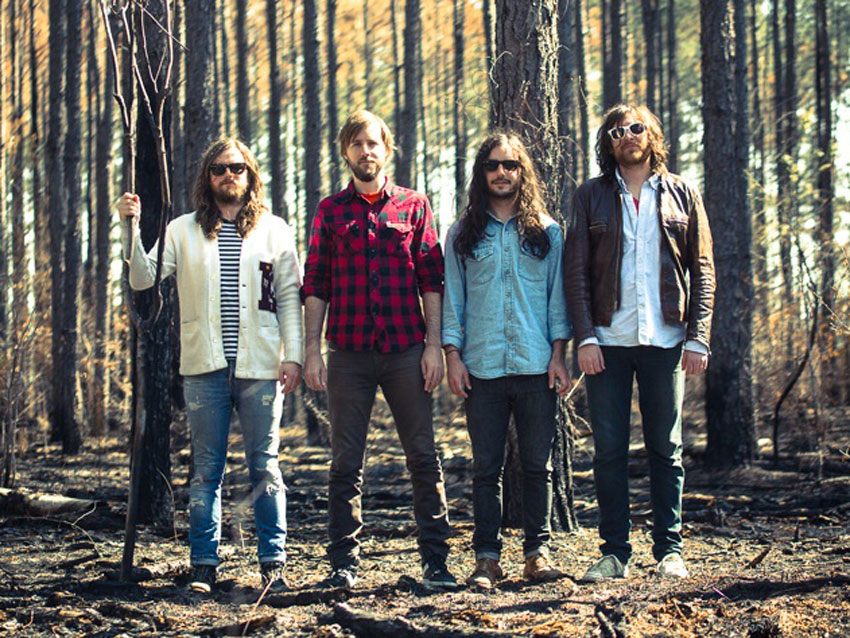
Logan Davis
BASS EXPO 2014: For those of you who always keep one eye on the bass player in any band, this round-up is for you. Taking in funk, pop, indie, hard rock, metal, and southern-infused sounds, we've rounded up some of our favourite brand new and new(ish) bands who will be releasing new music, and playing the UK this spring and summer.
Through a series of quick fire interviews, we get them to talk about their gear, musical heroes, and writing bass lines. From the Prince funk pop stylings of Bad Rabbits to the Led Zeppelin inspired riffs of J Roddy Walston & The Business, if you love low-end you'll be sure to find something inspirational here. First up is Logan Davis...
Logan Davis - J Roddy Walston & The Business
With comparisons drawn to Kings of Leon and Mother Love Bone, you know you're in for one heck of a free spirited rock 'n' roll ride with J Roddy Walston & The Business. Featuring a piano-pounding, intensely energetic singer backed by a super tight trio, this Tennessee band recently charted at number 14 in the States with their gloriously rowdy and ramshackle single Heavy Bells (listen out for a killer Led Zeppelin meets Black Sabbath riff at 2:38).
Better known in the US than UK, bassist Logan Davis is hoping their new album, Essential Tremors, will change that. A man who loves John Paul Jones, it comes across in his playing: tight, heavy, and full of attitude.
How would you describe your bass playing style and sound?
“I like to think that a version of my younger self - a pimply faced teenager squealing second gear on his way out of symphony rehearsal with Notorious BIG's Ready to Die making a statement out of my car speakers - comes through in my bass playing. Or maybe just a dude who plays with a pick and tries to rip off John Paul Jones as much as possible.”
How do you get your sound, and what gear do you use?
“Heavy pick and a slight mute with the right hand. Otherwise, pick up a fender bass and put it through something with a 15 inch speaker. I bring out the 8x10(s) for the huge live shows but anywhere else I love those low mids the 15s give you.”
J Roddy Walston & The Business' debut album is being released in March. From a bass point of view, which tracks should we make a bee-line for?
“For most of the album I tried not to be flashy, and instead support the other players in the band. I definitely stretch my legs a bit on Nobody Knows, and I would say pay attention to Take It As It Comes, and Sweat Shock, as I throw in a few licks you might not notice at first.”
What were the recording sessions like?
“Sweaty, off balance, and all in the same room. I learned a load tracking the bass on this record - our producer showed me a different picking style that recorded better; I played a different scale bass than I normally did; and we were working with no headphones in a small room in humid south Georgia. [It's either] step up to the plate or expect to be surrounded by a circle of glistening, heavily furrowed foreheads.”
Who were your musical heroes when you were first starting out, and why were there so inspiring to you?
“When I first started playing music it was on the violin, in which case I worshipped Mozart and Paganini. Starting out on bass, I'd say it was our guitar player Billy Gordon, who wrote all of the bass parts on our self-titled album that I learned when I joined the band for that CD release tour. Otherwise it was a crash course in rock bass - Paul McCartney and John Paul Jones.”
J Roddy Walston & The Business' new album, Essential Tremors, is out now on ATO Records. The band play their first ever UK shows this week, with London on Feb 25 and Manchester on Feb 26.
J Roddy Walston & The Business -Heavy Bells
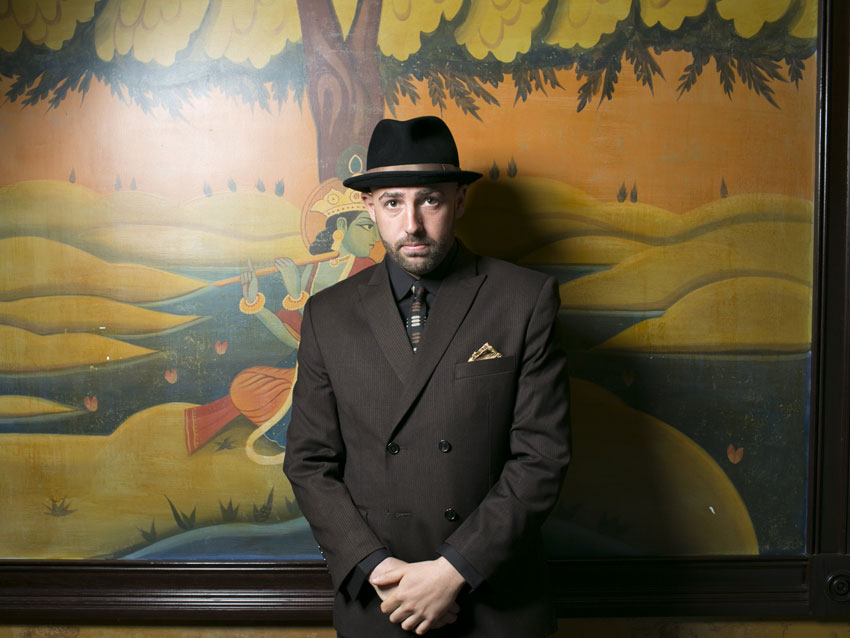
Graham Masser
A must listen for fans of Prince, Pharrell, and Miguel. Having formed in 2007, Bad Rabbits are still relatively new to UK audiences. Their latest album, American Love, is fast garnering a global audience, though.And no wonder with funk pop tracks as infectious as Dirty, and Dance Moves.
Rabbits bassist Graham Masser is an especially groovy player, knowing exactly when to hang back, weaving amongst the drums and guitar, and when to step it up. Picking up the four string when he was just 13, he took lessons until he was 21 - mostly studying jazz style...
Why bass? What's so appealing about it?
“I started on flute and then oboe, but by the time I reached middle school that seemed lame to me. I wanted to switch to guitar. My friend Randy had just gotten a Fender Strat and once I heard it, I was hooked. One of the ensemble teachers at our middle school tried to persuade me to pick up the bass because there were so few bass players and they were always in demand. Randy already played guitar and my other friend Rubin played drums, so I decided to go with bass so that we could start a band.
“Our first practise I knew absolutely nothing, but the first thing we played together was Aneurysm by Nirvana. After I started to get the hang of it, bass seemed to suit me better than guitar. I liked laying in the cut and not being the lead instrument. I also loved how bass acted as the bridge between the drums and the guitar and filled in that low end space. It's really powerful to me.”
How would you describe your bass sound and playing style?
“Subtle and supportive. I was never a player who had crazy chops or licks. I like playing more of a supportive role in a band, and only playing what is necessary for the song. To me, it was always more fun to listen to what everyone else was playing and try to be the support underneath it, not playing over it. I also tend to try and make my bass lines have a simple melodic motive or sub-hook.”
Which Bad Rabbits bass line are you most proud of and why?
“She's Bad from our Stick Up Kids EP. We demoed this song originally as a much more upbeat, heavier, New Jack Swing style song. When we were in the studio recording the actual album, I had a more melodic idea for the bass line that I kept singing in my head. I hummed it out then started playing it. We tracked it and it totally changed the vibe of the song and tied it all together, in my opinion.”
What gear are you currently using?
“White on white Ernie Ball Stingray five-string that I custom designed with them. They did an amazing job on it. For amplification, I use usually use an Aguilar DB751 head and Aguilar GS412 cab. I use a Aguilar ToneHammer as a direct box and EQ. Right now I'm getting into the Line 6 POD X3 Live and programming some new patches for our live show.”
Bad Rabbits will be touring the UK for ten dates starting May 1, 2014, in Cardiff. Their latest album, American Love, is out now on Bad Records.
Bad Rabbits -She's Bad
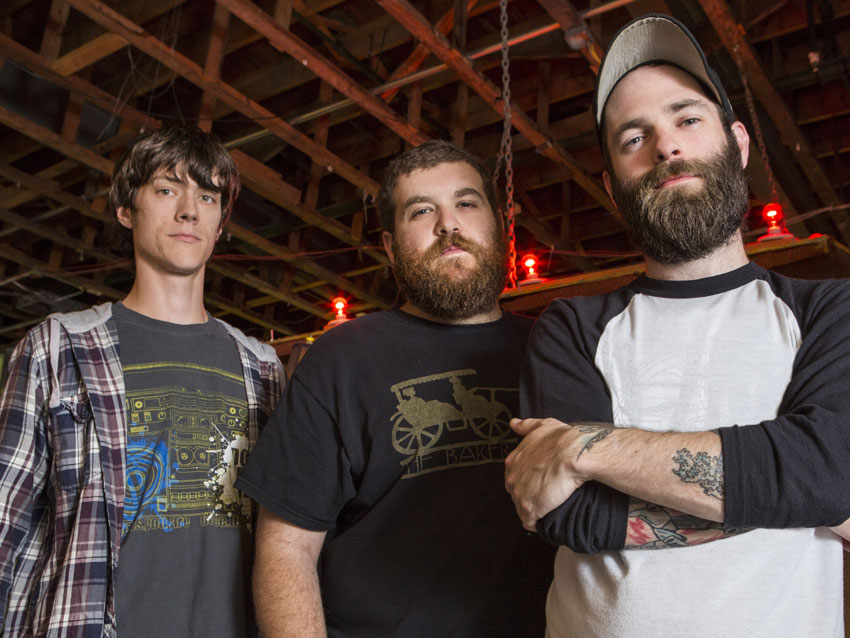
Henry Upton
The first signing to Clutch owned record label Weathermaker, somehow we just knew Lionize were going to rock hard. Based in Maryland, US, this power trio have much in common, sonically, with the band who signed them.
Bassist Henry Upton is an intricate part of Lionize's sound, with a technique that perfectly encapsulates all the hard rock and funk greats that came before him. That's right, we said funk. Because if there's one thing Upton does with ease in Lionize, it's to bring the funk.
Congratulations on signing with Weathermaker. Why do you think Lionize were such a perfect match for the Clutch owned label?
“We're very stoked to join Weathermaker. We've known and admired the Clutch guys for years and have done more than a dozen tours together. I think we share a love of playing and a really strong work ethic. We are both committed to playing live as much as possible. Beyond that, we have affection for a lot of the same records and musicians. Clutch has definitely led by example as we have tried to grow the band. This is a really exciting next step.”
How would you describe your playing style and sound in Lionize?
“To generalize, I'm coming from a funk perspective. I'm most interested in a nice deep pocket. As a listener, I want to hear a groove which informs much of how I play. I love rock music and we've definitely grown more in that direction. I'll try to incorporate some jazz ideas, attempt to get 'outside'. I want to be some mutation of Geezer Butler and Verdine White [Earth, Wind and Fire].”
We're looking forward to seeing you in the UK this Spring. What can we expect from seeing Lionize live?
“It will be loud, we will improvise, and we will be playing most if not all of the new record, Jetpack Soundtrack. We think the new tunes are the best we've done so far. It's our first time playing overseas, which is a thrill as well. It's a good feeling to expand the map and play for new crowds.”
When did you first get into playing bass guitar?
“I got my first bass when I was 13. I'd been playing saxophone for a few years and started listening to Parliament, the Red Hot Chili Peppers, and lots of other funk music which really inspired me to switch instruments. I had taken sax lessons for a few years and applied some of that knowledge to the bass but didn't keep up the lessons. I taught myself out of a few instructional books, playing along to records, and jamming with friends. High school jazz band also helped a lot.”
Is feel more important than theory, or is it important to have a balance of both?
“It's definitely a combination of both. I try to expand my knowledge of theory however I can, though I wouldn't say I regularly study it. Our organ/keyboardist Chris Brooks has a great mind for theory and is a big help. Nothing sounds good without the right feel and groove, and theory allows you to take that groove more places - to say more things and ultimately play what you hear in your head. That's the real goal.”
How do you get your sound? What gear do you use?
“Right now I'm playing a Gibson EB-0 through a Sunn 300T. I've been using a Morley Dual Bass Wah which gets a nice distorted sound on the funk setting. I also have a Lakland Jazz Bass which sounds great. With our new stuff, I've been gravitating towards the Gibson. It has a thicker, warmer tone, although it's a bit trickier to play.”
Which Lionize bass line are you most proud of?
“I'm more used to self deprecating assessments of my bass parts but, right now, I'd say the verse part in Amazing Science Facts on our upcoming record. It's particularly simple and feels great to play.”
Lionize will play a bunch of live dates in the UK this year, starting April 22 in Newcastle. Their new album, Jetpack Soundtrack, will be released on April 14.
Lionize -Reality Check
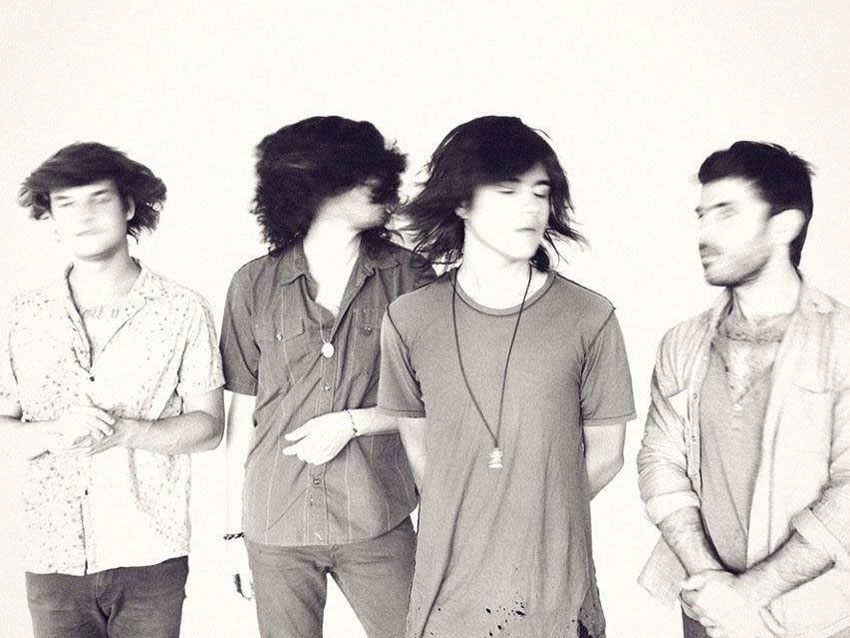
Augusto Vega
Fresh from Los Angeles, California, brand new indie quartet Northern American describe their music as a picture of the city they live in. “From The Doors to Tupac, we are inspired by the same sunset, Los Angeles; the place that was and always will be.”
Currently in the studio preparing their debut album, slated for release this summer, the band have started working with Local Natives producer Raymond Richards. Having recently shared their new single, Wander, free with fans, Northern American are gathering rave reviews from peers and critics alike.
Bassist Augusto Vega may be a man of few words, but his smooth, effortless indie pop playing style speaks volumes.
When did you first start playing bass guitar?
“At 13, [back in] 1999. I never had lessons but my uncle showed me how simple it was.”
When first starting out on bass, who were your musical heroes?
“When I first started playing bass I really liked Nirvana and Radiohead. Bass playing to me, though, was always more about being a part of something bigger, like a band.”
How would you describe your playing style and sound with Northern American?
“Simple yet present, welcoming and fat.”
Which Northern American bass line are you most proud of and why?
“Hard to say... I'm proud of everything we are doing collectively. It's because of my band that I'm able to come up with bass lines.”
What gear are you currently using?
“I'm rocking a Sunburst finish Thunderbird and a combo Fender amp. No pedals so far. Monster cable, lifetime warranty. That's wussup.”
Northern American's debut album is scheduled for a summer 2014 release.
Northern American -Wander
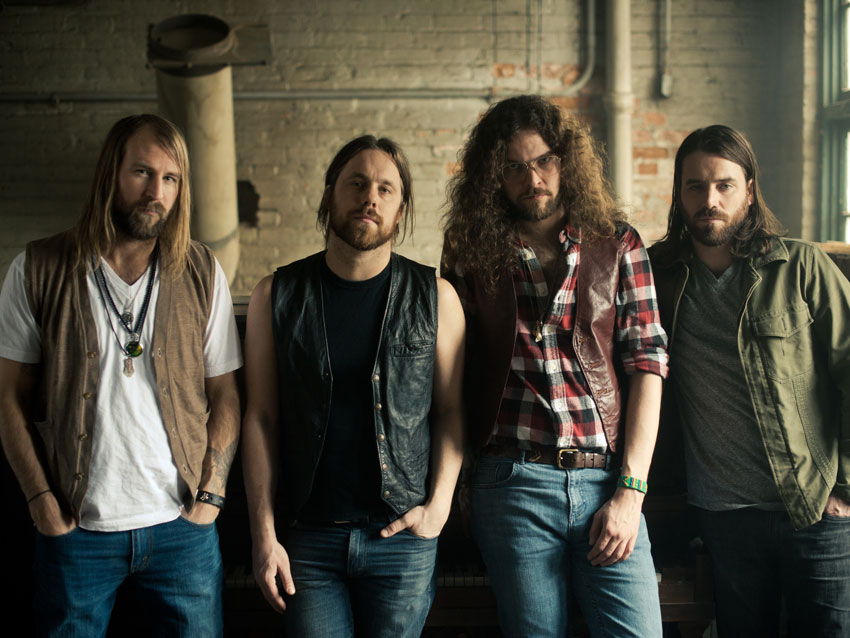
Jon Harvey
Evoking Mountain, Clutch, and Black Sabbath, Monster Truck love it loud, hard and fast. Nominated in Classic Rock's 2012 Roll Of Honour for best new band, Monster Truck have been lavished with praise from the music press: Guitarist magazine referred to their music as a 'Heavyweight, car-crushing riff-fest', while Metal Hammer called them 'Gloriously big-boned pure rock fury.'
Jon Harvey is the four stringer for these Canadian rock 'n' rollers. A seasoned player with heaps of power and groove, he's a big fan of aggressive sounding bass...
When did you first start playing bass guitar?
“I started playing bass about 15 years ago when some friends asked me to join their band. I bought a bass guitar and learned to play. My only lessons were for the drums.”
How would you describe your playing style and sound in Monster Truck?
“I play with a pick to guarantee that I get the attack I want. I like playing 'precision style' basses and tube amps. If there are no tubes, I don't want it. Aggressive is the style and sound I always want, whatever incarnation that presents itself in.”
How do you get that sound - what gear do you use?
“I use an F Bass VF4-P. It's a vintage series precision type monster. Best bass I've played. I use Traynor YBA300 heads with 4x12 cabinets. Once again, my absolute favourite tone from an amp. I use no effects. Tone is in the hands anyway.”
What do you think are the defining characteristics of a great heavy rock bassist?
“Heavy rock always needs power and confidence. Any bass player that can lock in with a drummer and make you the feel the groove is suited for rock.”
Monster Truck play 12 dates in the UK this spring, starting March 6 in London. Their latest album, Furiosity, is out now on Dine Alone Records.
Monster Truck -Sweet Mountain River
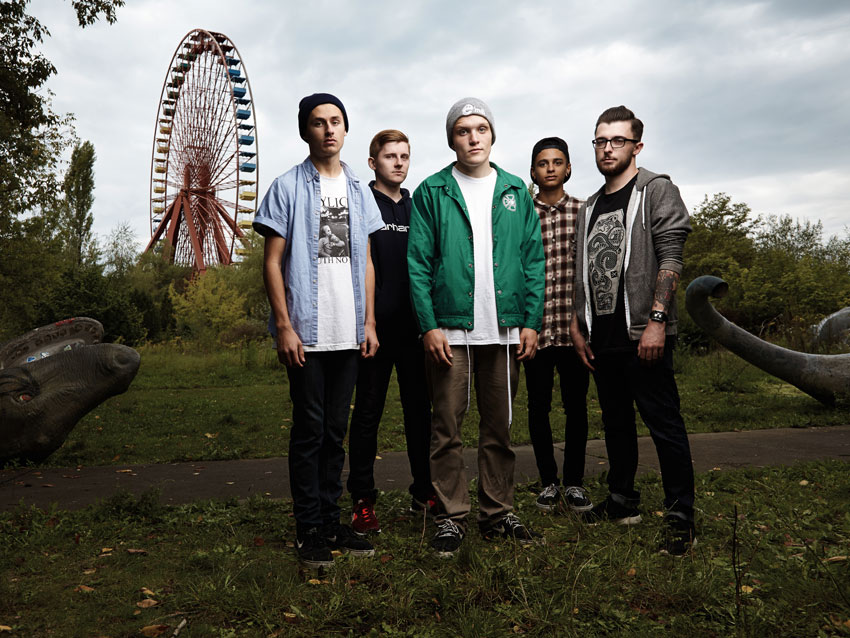
Fil Thorpe-Evans
A pop punk band straight out of the ex-mining town of Wrexham, North Wales, Neck Deep started off as a bedroom project before moving to a rehearsal studio and finally a stage. Catchy, insistent and memorable, their music is box fresh whilst bringing to mind the more vintage sounds of established pop punk bands like Alkaline Trio, Blink-182, and New Found Glory.
Fil Thorpe-Evans has been playing bass for years, feeding himself on a diet of Mike Dirnt and Mark Hoppus while growing up. It comes through in his playing, too - melodic, punchy, and at all times serving the song.
Who were your musical heroes when you were first starting out on bass?
“Bands like Green Day and Blink-182 were defo the reason I got into music the way I did. But Blink were more the reason I got into the style of music I play, and Mark Hoppus was one of the first bass players who was a real inspiration to me. I played guitar before I played bass but he was one of the people who made me realise bass is awesome and isn't just the instrument some nerd at the back of the stage plays.”
Why choose bass guitar - what's so appealing about it?
“I mean, in reality, I play a few musical instruments. I ended up playing bass in the band because that was the gap that needed filling, but I do love it and would choose it over guitar every time now.”
What gear are you currently using?
“I use a Fender Jazz Modern Player bass, and an Orange AD200 MK 3 head with an Orange 8x10 cab. Plus a Sans Amp Bass Driver pedal.”
You're gathering quite a fan base already. What has been your highlight of being in Neck Deep so far?
“I think just the opportunity to travel. I've always wanted to tour and travel, and we've been lucky enough to go to America, Australia, and Europe, which is amazing”
Finally, which Neck Deep bass line are you most proud of?
“Losing Teeth has some awesome bass licks in there that I'm pretty proud of. Also Growing Pains has a pretty tasty bass line, too.”
Neck Deep's debut album, Wishful Thinking, is out now on Hopeless Records.
Neck Deep -Losing Teeth
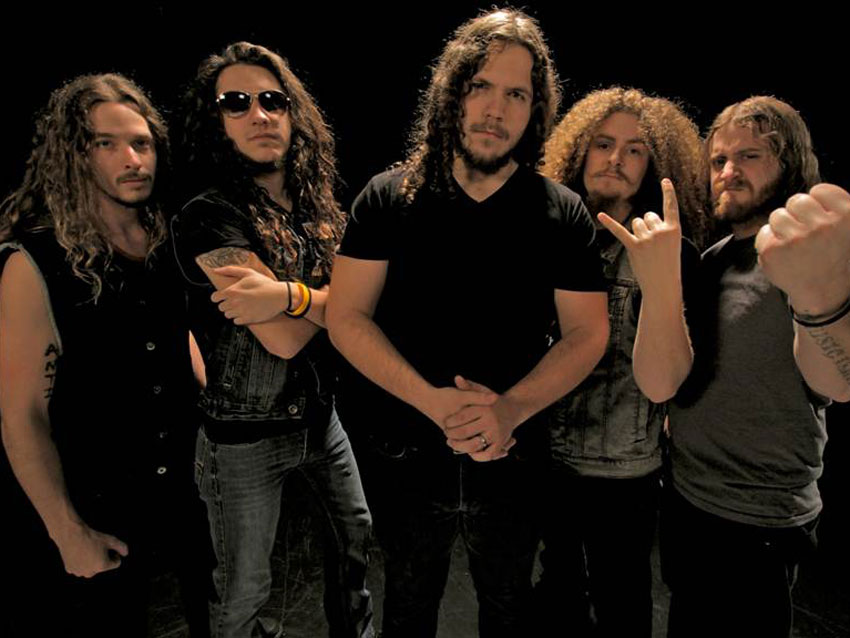
Corey Henderson
Managed by the same team behind Slipknot, the hard rock scene has recently been buoyed by the grit and growl of Oklahoma five-piece Anti-Mortem. The band were raised on a palette of southern rock and heavy metal, which makes sense considering how they deal in huge, groove laden heavy rock anthems.
With over 300 hundred shows to their name already, Anti-Mortem are no strangers to the road. Their forthcoming debut release, New Southern, was produced, recorded and mixed by the legendary Bob Marlette (Lynyrd Skynyrd, Rob Zombie, Black Stone Cherry), and features some solid playing from bassist Corey Henderson.
A fan of Cliff Burton and Rex Brown, you can hear their influence in the way Henderson backs up the band's muscular guitar riffs, laid down by Nevada Romo and Zain Smith, giving Anti-Mortem a growling, bass heavy sound that's enough to rattle bones.
How would you describe your bass guitar playing style and sound in Anti-Mortem?
“My sound is a heavy growl. Full and clear.”
How long have you been playing bass for, and are you self-taught or schooled?
“I have been self taught for six years, but tips from friends have always helped!”
What playing techniques do you regularly use when writing bass lines?
“I try to cover as much as the guitarist do as far as riffs go. I think simple things are the best things. Clear and punctual.”
You're a relatively new band so some people in the UK may be yet to discover you. Which Anti-Mortem songs best show off your bass chops and why?
“I like Ride Of Your Life because it really shows how heavy my bass can be.”
Who were your bass heroes when you were first starting to play?
“Growing up, Cliff Burton really grabbed my attention because of the way he played his bass like a guitar. But the longer I played, Rex Brown and John Campbell started to influence me.”
Anti-Mortem's debut album, New Southern, will be released April 28 via Nuclear Blast Entertainment. The band will also play Download festival this June.
Anti-Mortem - Stagnant Water
“Every note counts and fits perfectly”: Kirk Hammett names his best Metallica solo – and no, it’s not One or Master Of Puppets
“I can write anything... Just tell me what you want. You want death metal in C? Okay, here it is. A little country and western? Reggae, blues, whatever”: Yngwie Malmsteen on classical epiphanies, modern art and why he embraces the cliff edge
“Every note counts and fits perfectly”: Kirk Hammett names his best Metallica solo – and no, it’s not One or Master Of Puppets
“I can write anything... Just tell me what you want. You want death metal in C? Okay, here it is. A little country and western? Reggae, blues, whatever”: Yngwie Malmsteen on classical epiphanies, modern art and why he embraces the cliff edge









